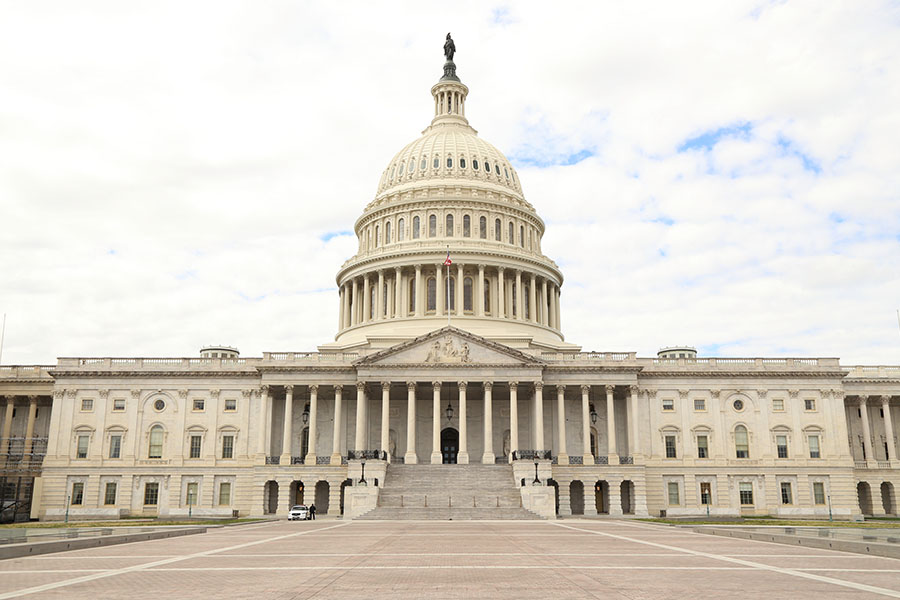
Congress has once again narrowly averted a government shutdown, passing a stopgap funding measure that ensures the government will remain open until early 2024. But the bill likely increases the risk of a government shutdown in February.
The legislation, crafted by the new speaker of the House, Rep. Mike Johnson (R-La.), extends government funding at current levels in an unusual two-tiered manner. Several agencies, representing about 20% of government spending, are funded through January 19. The rest of the government is funded through February 2. That means that Congress will have a pair of deadlines looming in the new year.
The package cleared the Senate on an 87-11 vote late on the evening of November 15. That followed a 336-95 vote in the House of Representatives on November 14. President Joe Biden plans to sign the bill into law prior to the November 17 deadline. The final package did not contain any controversial policy provisions or spending cuts, which led most Democrats to support the proposal. More than 90 House Republicans, frustrated by the lack of spending cuts, voted against it.
This marks the second time this fall that Congress has rallied to keep the government open shortly before a deadline. On September 30, lawmakers agreed to a temporary extension through November 17, a decision that led to directly to the unprecedented ouster of former Speaker of the House Kevin McCarthy (R-Calif.). Johnson, who has been on the job for less than a month, crafted a similar deal this week but is not likely to meet the same fate as his predecessor, as House Republicans appear inclined to give Johnson more time to settle into his leadership role.
How did we get here?
Funding government operations is perhaps the most fundamental annual task of Congress—but one that has become increasingly divisive over the past two decades. Lawmakers are supposed to pass the 12 appropriations bills that fund every government agency and federal program by September 30 each year, in time for the start of the federal government's fiscal year on October 1. It's a deadline Congress has not hit in more than 25 years, forcing temporary extensions to give lawmakers more time to negotiate the final appropriations bills.
Without a temporary funding measure, the government shuts down. Essential workers, such as military personnel and air traffic controllers, work without pay during a shutdown, while hundreds of thousands of federal workers are furloughed. All federal workers typically receive back pay once the shutdown ends.
The most recent shutdown, which began in late December 2018 and lasted 35 days until late January 2019, was the longest ever.
What's next?
This year's funding debate has been particularly challenging, with a divided Congress struggling to pass the appropriations bills. As of November 16, nearly two months past the deadline, the House has passed eight of the 12 funding bills, while the Senate has passed just three. In the weeks ahead, each chamber will need to pass its version of the remaining bills and then will have to embark on House/Senate negotiations to reconcile the many differences between those versions. Both the House and Senate must then vote again on the consensus bills before they can be sent to the president for his signature.
While Congress bought itself an additional two months, there is broad skepticism in Washington that there will be enough time for each chamber to pass the bills before the new deadlines, let alone negotiate with the other chamber to reach consensus. The House and Senate are taking very different approaches to overall funding, with House Republicans pushing for spending cuts that the Democrat-controlled Senate is unlikely to support. The uncertainty around how those differences will be resolved has led many to think that a shutdown is all but inevitable when the January/February deadlines arrive.
The deal also leaves unresolved another issue: emergency spending for Israel, Ukraine, and other crises. Biden proposed a $106 billion emergency spending package last month that would include: more than $60 billion in aid for Ukraine; $14 billion for Israel; $14 billion for border security; $10 billion for humanitarian aid for Ukraine, Israel, Gaza, and other hotspots; and $7 billion for Taiwan and other Pacific allies to help respond to China's aggression in the region. That package, or at least some pieces of it, is likely to be debated when Congress returns to Washington after the Thanksgiving break, but disconnecting it from the must-pass funding extension bill leaves the timing and fate of the emergency spending proposal uncertain.
The policy analysis provided by the Charles Schwab & Co., Inc., does not constitute and should not be interpreted as an endorsement of any political party.
The information provided here is for general informational purposes only and should not be considered an individualized recommendation or personalized investment advice. All expressions of opinion are subject to changes without notice in reaction to shifting market, economic, and geopolitical conditions.
Data herein is obtained from what are considered reliable sources; however, its accuracy, completeness, or reliability cannot be guaranteed. Supporting documentation for any claims or statistical information is available upon request.
1123-39SR

